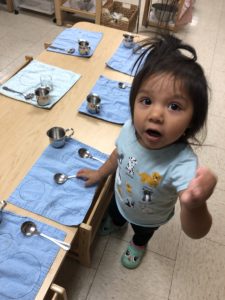By Sujata Dand

Photo by Sujata Dand
Two-year old Rosa Ramirez quietly sets the table for her classmates at the Lumin Bachman Lake Community School. First, she puts down the placemats, next — the cups for water, and finally — the spoons.
“Cuchara,” she says. “Spoon.”
“She is getting ready for lunch,” her teacher says with a smile.
There are two Lumin Montessori classrooms here at Bachman Lake Together, a community collaboration focused on early childhood education. Toddlers, 18 months to three years old, work on their social and academic skills. In Rosa’s class, one child carefully pulls out a tray with colorful pegs while another child is rolling out a rug, ready to set up a picnic. The children move around freely and choose from a range of hands-on educational materials.
“They are learning to be independent and responsible,” says Terry Ford, executive director of Lumin Education. She started the organization 40 years ago. “While the methods used by Dr. Maria Montessori weren’t new when we adopted them, it was a new idea to offer this alternative to children in gang-infested, low income neighborhoods in Dallas.”
It all began in 1978, when Ford was a young teacher at Mount Auburn Elementary School in East Dallas.
“I lived in the neighborhood and loved teaching first grade,” she remembers, “but, I kept seeing these bright intelligent kids falling through the cracks.”
Ford worked with other teachers, including Lumin co-founder John Fullinwider, neighborhood parents and children to create a small weekly summer program.
“When Lumin opened our first classroom, there was no opportunity for parents with limited means to access Montessori education in Dallas,” Ford says. “We have been a pioneer.”
The program grew. Today, Lumin Education serves more than 600 children and their parents every year. Lumin East Dallas Community School and Lumin Lindsley Park, just blocks away from Mount Auburn Elementary, are public charter schools offering Montessori classes for preschool children to third grade.
“We have been able to track children over the past four decades,” Ford says. “And, we are seeing a powerful impact on the lives of children that get this kind of education in the first nine years of life.”
Almost 75 percent of the students Lumin serves are low-income. A recent study from the University of Virginia found for children in poverty, a Montessori approach can help them close the learning gap faster and more effectively. Ford’s results are similar.
“Ninety-six percent of the children who attend a Lumin Education school graduate from high school, and 89 percent of those kids go on to college,” she says. “Over the years, one of the most important things that we have learned is that for children to have the best chance possible, we need to start working with them as soon as possible.”
That’s why Lumin started a home visiting program that teaches new parents about the developmental needs of children. Families receive weekly home visits before the child is born until age three. The goal is for parents to be actively and confidently involved in their child’s education.
“Parent educators were once first-time parents [in the program]” Mireya Serna, a coordinator for the program, explains. “There’s nothing stronger than a mom talking to another mom.”
Lumin’s pioneering approach appealed to filmmakers Vina Kay and Jan Selby who live in St. Paul, Minn. Their documentary “Inside Montessori” is comprised of five stories from Montessori schools around the country: four public programs, including three charters and one district school, and one independent school. The film spans the developmental continuum from birth through 18 years.
“People don’t really understand what Montessori is,” Selby, an award-winning producer and director, says. “They think its only for children in preschool and for families of privilege.”
“We wanted to show that there are many models of public Montessori available for children of all ages,” Kay, executive director for Voices for Racial Justice, explains. “This form of education works and should be available to every child.”
Lumin continues to grow with hopes to expand their primary and elementary classrooms. But they also see their role in helping create other transformative schools. Eduardo Mata Elementary School in East Dallas had trouble attracting parents and students. Ford says Mata’s principal visited Lumin’s two East Dallas campuses and was impressed.
“We had a waiting list of over 700 kids,” Ford says. “Mata needed to increase enrollment.”
That was in 2014. Four year later, Mata is one of the most sought-after choice schools in Dallas ISD. “Lumin is a proud catalyst for other schools,” Ford says. “We love the idea of this work spreading. This is a breakthrough of Montessori being available more widely regardless of financial means.”
Lumin Education is a private/public partnership. For more information, visit LuminEducation.org. For more information on the documentary, “Inside Montessori,” visit InsideMontessori.org.
